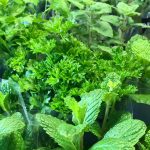A plant without a persistent woody stem above ground.
In botany, a nonwoody plant annual, biennial, or perennial whose aerial portion is relatively short lived (in the temperate zone, only a single growing season).
A plant which can be used in preparing medicines.
In botany, any plant that does not have permanent woody stems, such as petunias and zinnias. In gardening, a plant whose leaves or shoots are added to food to enhance its flavor or used in the preparation of medicines.
Herbs are typically defined simply as plants that do not have a woody stem. Herbal preparations are compounds produced from herbs that are thought to have medicinal or nutritional properties. Many herbs and their preparations are marketed as potential ergogenic aids as well as for other health properties. Most of these claims are unfounded, yet the sale of herbs remains big business.
An annual, biennial, or perennial plant with a soft stem containing no wood, especially an aromatic plant used in medicine or seasoning. The plant usually produces seeds and then dies back at the end of the growing season.
Any non-woody, soft and leafy plant, hence a herbaceous perennial; also a plant used in medicine and cooking.
A plant or plant part that is used for its flavor, scent, or therapeutic properties.
Herbs can greatly enhance the flavor of soups, stews, and slow-cooked dishes, and having a supply of them in the kitchen is recommended. Even if space is limited, a small herb garden can be grown in flowerpots or window boxes.
In the field of naturopathy, a substance derived from plants, such as an extract or derivative, recommended for the purpose of promoting health or facilitating healing.

